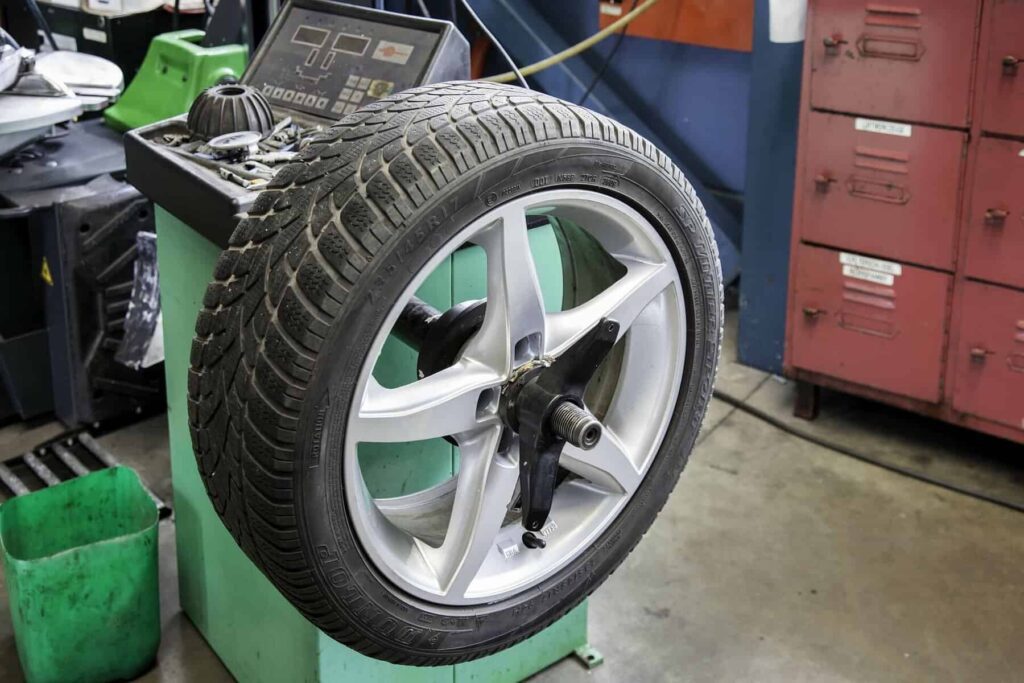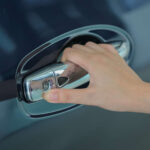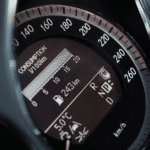The steering wheel shaking at 60 mph is usually a straightforward problem to rectify, caused by an imbalanced wheel 90% of the time.
Although wheel balancing is the most common cause, if you’ve ever experienced driving with a wheel balance issue, you’ll usually describe the issue as a vibration instead of shaking. Therefore, it is important to be aware that other components can fail, which will also cause the steering wheel to shake; I’ve included the most common causes and more detail on them in this article.
6 Reasons Why Your Steering Wheel Is Shaking at 60MPH
Over the years of inspecting this type of problem almost weekly, I’ve come to learn that wheel balancing is the most common cause of all vibrations on the steering wheel, through the car, etc.; however, I’ve occasionally found one of the other items below to be the root cause, so I never assume.
Wheel balancing issue
When a tire is replaced, the wheel must be balanced using a wheel balancing machine. This machine quickly rotates the wheel and identifies any impurities in the wheel and tire. Based on the analysis, the technician is informed where to apply balance weights.
The reason for balancing the wheel is to counteract any imperfections in the wheel or tire. For instance, one side of the wheel may be heavier than the other, or one side may have a minor buckle, which is not noticeable to the eye. These issues can cause the steering wheel to vibrate when you drive.
The vibration becomes noticeable when you drive at around 50 – 55 mph. It works through all the suspension components and eventually reaches the steering wheel. Speeding up past 60 – 65 mph makes the vibration less noticeable until it disappears altogether. This is because the imperfections in the wheel and tire rotate quickly enough to bypass any defects, making the car feel like it’s driving on a perfect circle.
There are several reasons why a wheel may become unbalanced. For instance, it could happen if the technician didn’t balance the wheel properly when replacing the tire or if a balance weight has become loose. Additionally, hitting the curb or driving over large potholes can knock the wheel out of balance.
Having a tire garage carry out a wheel balancing check is one of the cheapest repairs you can do, and if it is out, a rebalance will solve the issue.
Wheel bearing failure
A car wheel bearing is a set of steel balls enclosed by a metal ring that fits snugly around the axle shaft and wheel hub. The wheel bearing assembly is located at each wheel’s hub, and its job is to allow the wheel to rotate freely while also supporting the vehicle’s weight.
A wheel bearing causing a steering wheel shake at 60mph is rare, as the car usually sounds like an aircraft taking off when a wheel bearing is faulty. However, the bearings rotate on a track in a housing packed with grease. Old wheel bearings or those with the casing split can become dry. Dry bearings rotating get extremely hot, and the bearing internals collapse, causing a vibration that can be felt at 60mph.
Replacing a wheel bearing often requires a large hydraulic press, and if forced into the hub incorrectly, it can damage the hub and a new bearing. So you often need a mechanic to replace wheel bearings for you. However, you can determine if a wheel bearing is faulty by jacking up a wheel and spinning it; you will hear the rumbling noise when you have found a faulty one.
Driveshaft problem
As per its name, the driveshaft connects the engine to the wheels so you can accelerate down the road. These are perfectly straight but can bend from an impact, such as with a curb. Imagine trying to spin a banana instead of a straight rod; at 60 mph, this would violently shake. Not only would the steering wheel shake, but depending on the severity, the whole car, too.
Replacing a driveshaft is another job best left to a mechanic; if it goes wrong, you can lose all of the transmission oil and cause further problems to the hub and wheel bearings.
Buckled rim
A buckled wheel that is noticeable to the eye will not balance correctly. A wheel should be round or as close to perfectly round as possible. Imagine trying to drive down the road on an egg-shaped wheel (it probably won’t be this severe, I know); the shaking from the wheel would be amplified through the car.
A quick test to see if the wheel is the problem is to move the wheel to a different side of the vehicle. For example, a buckled wheel at the front of the car will cause the steering wheel to shake, but if put on the back of the vehicle, the whole car will vibrate, and you will feel it through your bum on the seat rather than the steering wheel.
A local wheel refurbishment company can usually repair a buckled rim, which solves the issue 9 times out of 10. The only downside to a wheel refurbishment is you will have a weak point on the rim that can often easily get damaged again, putting you back in square one, so it may be better to consider a rim replacement.
Worn suspension component
A car’s suspension is a complex system with many moving ball joints and connecting rods. These can become worn or damaged due to minor impacts from potholes, curbs, and driving over speed bumps. This is usually indicated by a knocking noise over bumps in the road while driving. However, if a ball joint is severely worn, it may wobble in its housing, resulting in a shake on the steering wheel. It’s important to note that this is a rare occurrence, and you will likely notice other problems, such as knocking when turning or rattling noises, before the steering wheel begins to shake.
You can check the suspension components by jacking the vehicle up, supporting it on axle stands, and putting your hand on each ball joint or bush. Have someone carefully rock the steering wheel from side to side while holding each ball joint; you will feel any play or knocking in a problematic part. It can be time-consuming to check each part, but once you find the culprit, you can look to replace the offending item.
Seized brake caliper
A brake caliper is a component of a disc brake system that applies pressure to the brake pads, which in turn clamp down on the brake rotor to slow or stop the vehicle.
If a brake caliper is seized, it can cause a brake rotor to overheat quickly, resulting in its distortion and warping. A warped brake rotor, much like an unbalanced wheel, can generate vibration while driving. However, unlike an unbalanced wheel, a warped brake rotor cannot be balanced, and it needs to be replaced. Typically, a warped brake rotor on the front will cause the brake pedal and the steering wheel to shake when braking.
There are many reasons a brake caliper might seize, but the most common is the failure of the seal that moves the brake piston inside the caliper. The seal turns over and will not return the piston when you release the pedal. If the seal of a brake caliper falls apart, it can cause the piston in the caliper to stick.
Before just replacing the caliper, it’s important to note that it might not be the caliper at fault. The brake hose can sometimes collapse, giving you the illusion of a failed caliper. Checking either requires removal and checking each components operation.

Is It Safe to Drive With a Shaking Steering Wheel at 60MPH?
The severity of the shake would determine whether you should even consider driving. For example, a steering wheel shake caused by a wheel balancing issue is generally a minor vibration that will not immediately cause further problems, so you can continue your journey. Long term it will caused increase tire wear.
However, if the steering wheel shakes at 60mph, it is pretty vicious; you shouldn’t drive for more than one reason.
Number one, it will likely cause more damage to other components.
Number two is if a faulty wheel bearing is the cause. A faulty wheel bearing will get extremely hot and start to melt driveshafts, and other problems will arise; in the worst case, the wheel could even come off!
It’s tough to determine whether it’s safe to drive without knowing the cause of the problem. If you notice a vibration starting to appear on the steering wheel, especially when getting up to 60 mph, you should get your mechanic to check over the vehicle. The best-case and most common scenario is that it’s a simple wheel balancing issue that is inexpensive and takes almost no time to fix.
How to Diagnose the Cause of a Shaking Steering Wheel
Diagnosing a steering wheel shake is pretty straightforward. When driving at 60mph, push through to 65-70 (if the speed limit permits) and see if the shake disappears or becomes weaker. If it does, you can be sure you need to have your front wheels rebalanced. Wheel rebalancing costs are insignificant, so it would be wise to balance all four wheels.
If the steering wheel shake remains, you may need your mechanic to inspect it if you need to get more familiar with diagnosing a fault like this yourself. The thing with cars and shaking is there are many similarities between similar issues, car jerking, vibrations, and the steering wheel shaking; it is essential to differentiate them before deciding to replace something that may not be worn.
Final Thoughts
If you notice that your steering wheel shakes at 60 mph, there is likely an issue with the wheel balance. Usually, other problems that cause a shaking steering wheel have different symptoms. It’s advisable to have your mechanic inspect your car and fix any problems if you experience any issues with your steering wheel shaking. If you couldn’t find what you are looking for in this article, take a look at 13 potential reasons why your car is shaking when driving fast, which has some similar problems to look at.









